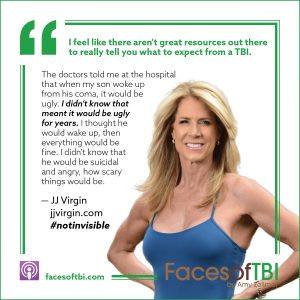 Celebrity nutrition and fitness expert JJ Virgin’s life changed when her 16-year-old son Grant got hit by a car. Suffering a coma and severe injuries, the doctors believed Grant wouldn’t survive, but JJ refused to give up hope. She vowed to help him improve, and against all odds, Grant not only survived, but began to recover. JJ shares her insight on their journey towards improving her son’s health, and what life is like now.
Celebrity nutrition and fitness expert JJ Virgin’s life changed when her 16-year-old son Grant got hit by a car. Suffering a coma and severe injuries, the doctors believed Grant wouldn’t survive, but JJ refused to give up hope. She vowed to help him improve, and against all odds, Grant not only survived, but began to recover. JJ shares her insight on their journey towards improving her son’s health, and what life is like now.
Find her book, Warrior Mom, on Amazon HERE.
- Points of interest:
- (2:32) Celebrity nutrition and fitness expert got a call that her 16 year old son Grant was a victim of a hit-and-run. Severe injuries and low survival rate led the doctors to encourage the family to let Grant die, but JJ refused. Memoir “Warrior Mom” talks about road to recovery.
- (4:40) Grant was in a deep coma. He had diffused axonal injuries (bleeding on the brain), and a torn aorta. The surgery needed to fix the torn aorta and prevent a rupture required blood thinners, otherwise his brain would bleed out. He wouldn’t survive an airlift, and the hospital was not fit for the operation.
- (5:20) Despite the doctors basically saying “he’ll die, so let him”, they decided to hold onto the fraction of hope. Survived airlift and surgery.
- (6:00) Neurosurgeons said they weren’t sure if Grant would ever wake up. Made the decision to do whatever was in her power to help Grant get to 110% (despite the 13 fractures, both legs in casts, and the coma)
- (8:12) In one hospital for two and a half months, then in a rehab hospital for another two months. Had to start from square one and reteach Grant everything: his name, brushing teeth, etc. They were supposed to be at the rehab hospital for 8 months, but JJ thought the familiarity of home would be beneficial.
- (11:40) Brain was unstable, suicidal thoughts weren’t survivor’s guilt, but depression and frustration. Suicidal ideation goes up 10 times after a TBI, 30% are more likely to go through with it.
- (16:09) Grant was supposed to be a junior in high school, but he couldn’t fit in anywhere. PE was to physically demanding and he had injuries, and the special education classes were too overstimulating.
- (16:41) What saved Grant’s life was a speech therapist, Marcy Etre, and a place called Kinetics that worked on improving his physicality and motor skills.
- (17:21) Reads and memorizes books, taught himself hydroponics, but would not be able to handle school because of time restraints. Had to make their own therapy, since there’s not really a place for Grant’s situation. JJ’s husband is incredibly patient.
- (18:40) Sent him to Utah to a group that specializes in cases like this. Grant could live on his own, the biggest issue would be loneliness.
- (19:09) Has memory back, has awareness back, but missed a lot of key socialization that was key and critical, and didn’t graduate high school.
- (21:07) You can find everything from ketogenic diets to stem cells to exosomes to peptides to neurofeedback MDR to cryo to hyperbaric.
- (21:37) “That person that you love is still in there, and you can’t let that go.” You’re surrounded by people who are patient and supportive, but who won’t let you off the hook. It’s not always pleasant, but absolutely necessary.
- (24:42) Loss of a filter, any thoughts or emotions are coming out raw. One moment could be hysterical laughter, the next could be seething hatred. When in the hospital, they gave him drug cocktails to calm him down. He would be strapped down with a guard outside his door because he could become incredibly violent.
- (26:01) You need to look for the triggers in order to handle the situation before it arises. Different treatments would get him ramped up again, and JJ took that as a sign that his brain was healing.
- (26:25) Part of it is also getting clear on what the new normal is.
- (27:34) Frustrated with the lack of resources available. Dr. Michael Lewis (When Brains Collide) and Dr. Dan Engel (The Concussion Repair Manual) were cited as helpful resources.
- (28:13) “If you’re a caretaker, make sure you’re taking care of yourself because this is a challenging thing.” Gotta keep seeing your loved one.
Listen to the full podcast HERE or on iTunes.